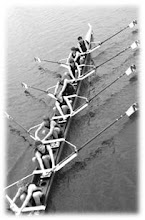By Allison Frederick
Colin Campbell is returning for his third season as the USRowing junior national team men’s head coach. Last year, he led the junior men’s eight to a bronze medal at the 2008 FISA World Rowing Senior and Junior Championships. Prior to taking over head coaching duties, Campbell served as a junior national team assistant coach, helping the U.S. win gold in the eight in 2005. Before joining Peddie School as the boy’s head coach in 2002, Campbell coached at St. Mark’s School, St. Paul’s School and Cincinnati Country Day School.
USRowing: You’ve coached several past U.S. junior teams and development camps, including last year’s bronze-medal crew. How will your experiences benefit you in building a successful junior team this year? Campbell: I have gotten more and more specific in defining and articulating what athletes need to do to prepare for, and to compete successfully at, the world championship level. I have also worked with Craig Hoffman, the Junior Men's Committee, Steve Hargis, and others at USRowing and around the country to rebuild the development camp structure that I first helped to establish in 1996 and 1997. With the layering of camps and opportunities, oarsmen and coxswains are more aware of what they need to do to prepare for international competition, and they are more experienced when they arrive first at selection camp and then at the world championships. This more extensive preparation should help the athletes prepare more thoroughly and race more effectively.
USRowing: What specific goals do you have for the junior national team this summer? Campbell: We are going to select an eight and a coxed four from the sweep camp and a quad from the sculling camp. We are also going to send two pairs and several doubles to trials. My goals for the summer are to run the most efficient, most effective camp I can, to select and prepare the best possible crews for the competition at the world championships and to win medals in at least two of four events.
USRowing: Can you describe the process for athlete selection from the beginning of the summer, up until the world championships? Campbell: We are going to bring 26 sweep oarsmen and 6 coxswains to Mercer Lake for the sweep camp. From that pool, we are going to build an eight and a coxed four, as well as two pairs that will compete at trials for the right to compete at the world championships. The selection process for the eight and the four will follow roughly the same guidelines we have used in the past four years. We do a lot of work in eights and fours, testing combinations and speed over 1,000-meter, 1,250-meter and 1,500-meter intervals. Using this data and some data from direct switches, we will designate an eight and a four that will compete at the world championships. From the remaining athletes, we will select two pairs, which will then race at trials for the right to compete at worlds.
USRowing: You’ve been the boys head coach at Peddie since 2002. Before that, you coached St. Mark’s School, St. Paul’s School and Cincinnati Country Day School. What do you enjoy most about coaching rowing at the high school level? Campbell: Rowing is a sport that rewards investment and effort. Many of the athletes that I have coached are not gifted physical athletes but have been able to compete very successfully at the high school and collegiate levels through determination and hard work. I have always focused on the commitment that athletes need to bring to their work in rowing, and I have always felt most successful when those athletes who are not exceptionally gifted have performed well.
USRowing: What are some of the biggest challenges of coaching at the junior level? Campbell: It is hard to get juniors to understand that their physical and psychological capacities are far greater than they recognize. Tony Johnson, my college coach, always used to challenge us to work beyond what we believed to be our limits. I think this is the greatest challenge with juniors because they are capable of far greater efforts and far stronger performances than many of them realize. Another challenge is training. High school students are very busy. They have a great deal on their plates, and training properly takes more time, energy, and discipline than many of them want to recognize or are prepared to commit.
Courtesy of USRowing



